Distinguished Women Mary Parsons
Mary Parsons
Province III – Diocese of Delaware
Mary is a life-long member of the Episcopal Church. She served for many years on the ECW Board in Delaware.
She has served many years in her local parish, St. Mary’s, Bridgeville, DE.
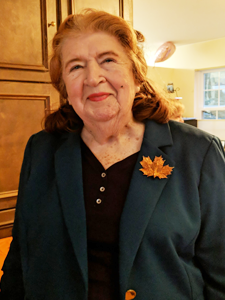

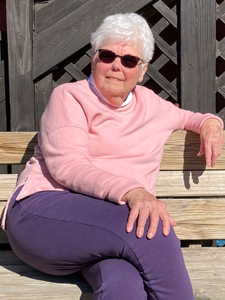
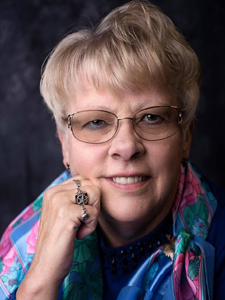
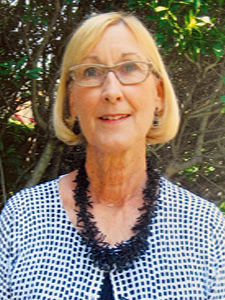

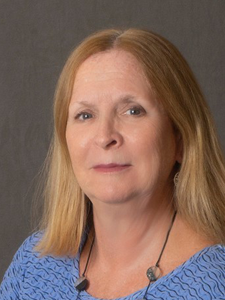



 La Historia de “La Cocina de Primeras Naciones” ha tenido sus raíces en el ocaso de los años 90 por medio de la Reverenda Melanie Spears, su esposo George y su familia, y la congregación de “La Misión India de Todos Los Santos”. Durante este tiempo, las conferencias del “Camino Entrelazado” o “Path Crossing” fueron sostenidas. El “Camino Entrelazado” o “Path Crosssing” promovió la exploración de asociaciones Interculturales, uniendo así predominantemente a las congregaciones nativo-americanas con las congregaciones anglosajonas en los Estados Unidos.
La Historia de “La Cocina de Primeras Naciones” ha tenido sus raíces en el ocaso de los años 90 por medio de la Reverenda Melanie Spears, su esposo George y su familia, y la congregación de “La Misión India de Todos Los Santos”. Durante este tiempo, las conferencias del “Camino Entrelazado” o “Path Crossing” fueron sostenidas. El “Camino Entrelazado” o “Path Crosssing” promovió la exploración de asociaciones Interculturales, uniendo así predominantemente a las congregaciones nativo-americanas con las congregaciones anglosajonas en los Estados Unidos.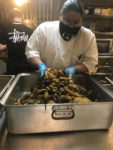 Cuando el Reverendo Robert Dos Toros visitó y entrevisto en la iglesia de “Todos Los Santos” después, expreso sus esperanzas de que un ministerio de alimentación empezara y fuera sostenible. Esto se concatena con lo expresado por el Padre Robert al expresar: “Alimentar y dar de beber al hambriento y sediento, hospedar al forastero, son tanto un mandato del evangelio como una practica Lakota.” Mateo 25: 35-36 establece, “Porque tuve hambre, y me diste de comer, tuve sed y me diste de beber, fui un forastero y me hospedaste, estuve desnudo y me cobijaste, estuve enfermo y cuidaste de mí, estuve en prisión, y me visitaste.”
Cuando el Reverendo Robert Dos Toros visitó y entrevisto en la iglesia de “Todos Los Santos” después, expreso sus esperanzas de que un ministerio de alimentación empezara y fuera sostenible. Esto se concatena con lo expresado por el Padre Robert al expresar: “Alimentar y dar de beber al hambriento y sediento, hospedar al forastero, son tanto un mandato del evangelio como una practica Lakota.” Mateo 25: 35-36 establece, “Porque tuve hambre, y me diste de comer, tuve sed y me diste de beber, fui un forastero y me hospedaste, estuve desnudo y me cobijaste, estuve enfermo y cuidaste de mí, estuve en prisión, y me visitaste.”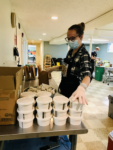 El Reverendo Robert Dos Toros aceptó el llamado a servir como el vicario de la iglesia de “Todos Los Santos” y el misionero para el departamento del Trabajo Indio en la Iglesia Episcopal en Minnesota o sus siglas en inglés (ECNM). Un plan detallado y cuidadoso se puso en marcha, y “La Cocina de las Primeras Naciones” o como lo indican sus siglas en inglés (FNK) empezó sirviendo el día de todos los santos, el 1 de noviembre de 2008. El Padre Robert ideo el nombre “La Cocina de Todas Las Naciones”, notando que vivimos cerca de la frontera con Canadá y el termino “Primeras Naciones” es usado para describir a los pueblos indígenas de Canadá. Estas palabras encapsulan el hecho de que los pueblos indígenas en los Estados Unidos también son oriundos de otras naciones y enfatiza las comidas que servimos: Orgánicas e indígenas.
El Reverendo Robert Dos Toros aceptó el llamado a servir como el vicario de la iglesia de “Todos Los Santos” y el misionero para el departamento del Trabajo Indio en la Iglesia Episcopal en Minnesota o sus siglas en inglés (ECNM). Un plan detallado y cuidadoso se puso en marcha, y “La Cocina de las Primeras Naciones” o como lo indican sus siglas en inglés (FNK) empezó sirviendo el día de todos los santos, el 1 de noviembre de 2008. El Padre Robert ideo el nombre “La Cocina de Todas Las Naciones”, notando que vivimos cerca de la frontera con Canadá y el termino “Primeras Naciones” es usado para describir a los pueblos indígenas de Canadá. Estas palabras encapsulan el hecho de que los pueblos indígenas en los Estados Unidos también son oriundos de otras naciones y enfatiza las comidas que servimos: Orgánicas e indígenas.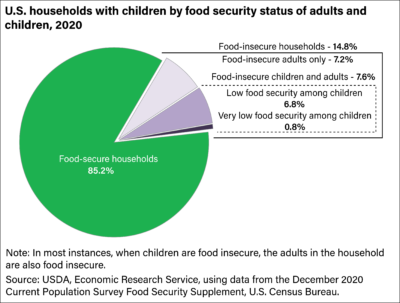 Since the pandemic started back in 2020, the Communique’ editorial staff has witnessed as well as discussed what services local ECW groups provide that have the largest impact in their community. Food by no surprise continued to rise to the forefront of community needs.
Since the pandemic started back in 2020, the Communique’ editorial staff has witnessed as well as discussed what services local ECW groups provide that have the largest impact in their community. Food by no surprise continued to rise to the forefront of community needs.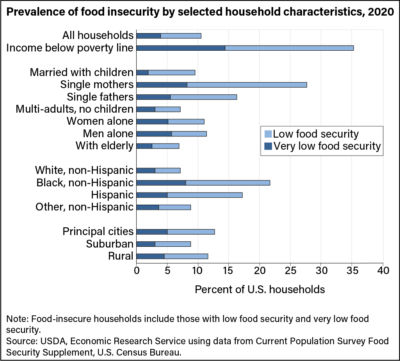 w food security, even when the parents themselves are food insecure. In 2020, 14.8 percent of households with children were food insecure. In about half of those food-insecure households with children, only the adults experienced food insecurity. But in 7.6 percent of households with children, both children and adults were food insecure sometime during the year. In 0.8 percent of U.S. households with children (322,000 households), both children and adults experienced instances of very low food security.
w food security, even when the parents themselves are food insecure. In 2020, 14.8 percent of households with children were food insecure. In about half of those food-insecure households with children, only the adults experienced food insecurity. But in 7.6 percent of households with children, both children and adults were food insecure sometime during the year. In 0.8 percent of U.S. households with children (322,000 households), both children and adults experienced instances of very low food security.